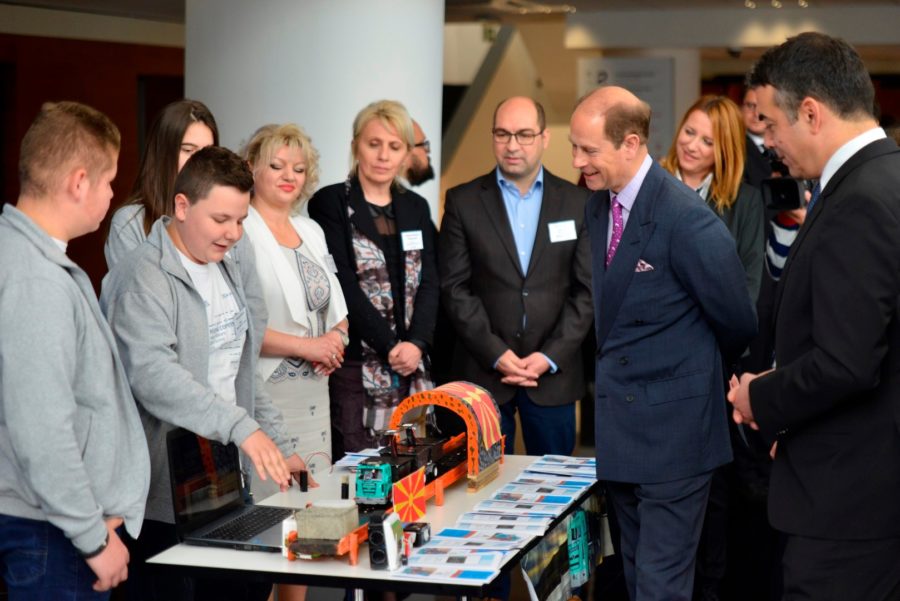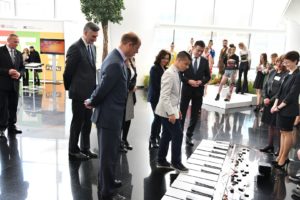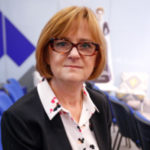24th May 2019 Skopje, North Macedonia
21 Century Schools programme gets a Royal Presentation in North Macedonia

His Royal Highness The Prince Edward, Earl of Wessex paid an official visit to North Macedonia on 15. May 2019. During the visit, he took special interest in the assistance that the United Kingdom provides to North Macedonia through the three year education programme 21st Century Schools.
As part of the event organised by British Embassy Skopje HRH The Prince Edward, Earl of Wessex met with students from the elementary schools “Blaze Koneski” from Prilep and “Cyril and Methodius” from Skopje, who are participating in the programme in North Macedonia.
The two projects presented by the students during the royal visit are the winners of the National competition in Coding and as such, participated at the recent regional competition held in April this year within the Western Balkans Digital Summit in Belgrade. At that competition, the team from elementary school „Blaže Koneski“ was awarded third place for their transport information system using micro:bits to monitor, control and optimize vehicle traffic, whilst the team from the school „Cyril and Methodius“ won the special award for the best team work with the large size synthesizer model controlled by micro:bits, producing the sound by stepping on the keyboard, simulating a piano.
21st Century Schools is an ambitious programme that aims to improve education in the region through ensuring that young people in the Western Balkans will have the right set of skills for better future employability. It addresses the gap between the knowledge students gain when completing traditional education and the employer-desirable skills they need when entering the job market.
A report by the Regional Cooperation Council (RCC) shows that there are relatively high current graduate skill gaps in analytical and problem-solving skills, adaptability and decision-making skills, and concludes those are expected to increase in the future. Further, the ICT sector with annual growth between 5 to 10% across the region, is one of the fastest growing sectors in the Western Balkans, with great potential to positively affect economic growth in the region.
As the world is getting more digitalised and automated, critical thinking and problem solving are becoming the most employer desirable skills. By teaching students these skills, as well as coding, using micro:bit, the 21st Century Schools programme provides a unique combination of human (critical thinking and problem solving) and digital skills (coding). By learning these skills students also adopt other core sills such as creativity, and team work.
In North Macedonia, over the three year period, 341 primary schools will be provided with training for all school leaders and 1883 teachers, and resources to enable introduction of innovative methodology in classrooms. As part of the programme, schools will be provided with 10200 micro:bits for students to learn coding and exercise newly gained skills in a fun, interactive and innovative way.

The programme works in partnership with all relevant institutions in North Macedonia and the region, to ensure the new teaching skills remain part of the education systems after the programme ends.
“The most important project for the region, 21st Century Schools, is happening right now,…, it is about elementary school children programing on micro:bit devices. The things they are creating are bringing us to digital transformation.”– Damjan Mancevski, Minister of Information Society and Administration, North Macedonia
The Programme is funded by the UK Government. Over the next three years the 21st Century Schools programme aims to improve education systems in the Western Balkans, by equipping over one million students aged 10-15 years in over 4000 primary schools with critical thinking, problem solving and coding skills. It builds upon the findings of the pilot project, implemented in 2017 and 2018 in 135 primary schools across Western Balkans.
Results of the pilot programme showed marked increases in teachers’ understanding of the importance of critical thinking and problem solving in classroom practice, and students reported higher levels of confidence in coding. Everyone reported a surge in motivation. Learning became fun.
